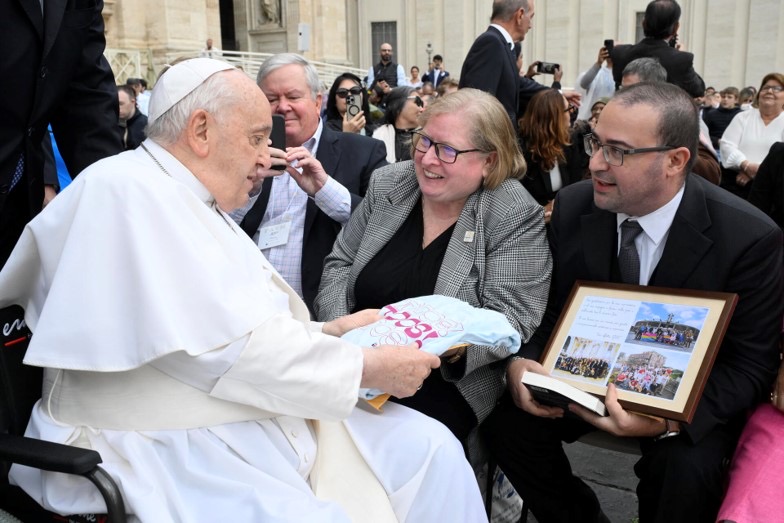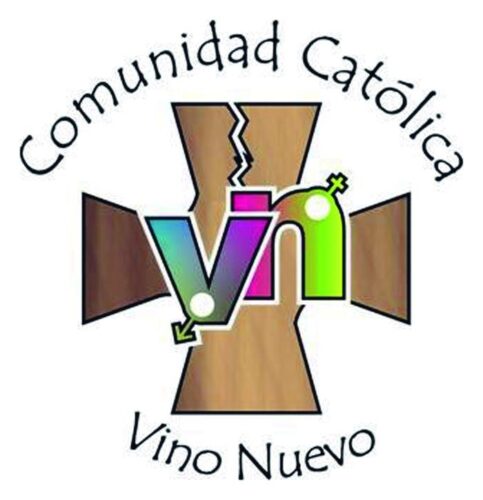It is a worthwhile question after how much we and our allies have invested in the synodal process. We have participated in listening sessions across the world, studied the reports, offered our feedback and tracked developments. Some of us reengaged in an institution that harmed us or someone we love. All of this was done in the hope change in the Catholic Church was possible through this synodal journey.
Now, to the question of whether there will be significant change, the best answer I can offer now is a most Catholic answer: possibly yes and possibly no.
Before I explain my answer for the present Synod, it is helpful to review how past synods under Pope Francis treated—or did not treat—LGBTQ issues.
The Synod on the Family
In 2014 and 2015, the Synod on the Family was held in two parts. Discussing contemporary family life was a prime opportunity to discuss LGBTQ inclusion. So many Catholics love someone who is queer, and families seek affirmation and support. In the church, it is not only LGBTQ Catholics, but our loved ones who face forms of exclusion. Simultaneously, LGBTQ identities remain a cause of painful divisions in families. And, of course, there are the families that LGBTQ people form through their relationships.
In the church, it is not only LGBTQ Catholics, but our loved ones who face forms of exclusion.
Hopes were high that the church would begin on a new, more helpful path from these two sessions. Yet, in its final report, the Synod on the Family focused on families with lesbians and gay people, not specifically LGBTQ people ourselves, writing:
To families with homosexual members, the Church reiterates that every person, regardless of sexual orientation, ought to be respected in his/her dignity and received with respect, while carefully avoiding “every sign of unjust discrimination”…Specific attention is given to guiding families with homosexual members. (p. 76)
The rest of that paragraph on homosexuality opposed “proposals to place unions of homosexual persons on the same level as marriage.” The report also stated it was “completely unacceptable” that international development aid, it falsely claimed, was tied to forcing “poor countries” to “establish ‘marriage’ between people of the same sex.”
Pope Francis picked up on these themes in his apostolic exhortation on the family, “Amoris Laetitia.” He reaffirmed the need to stop discrimination against gay people, yet also reaffirmed his claim of ‘ideological colonization’ by Western countries against the Global South.
The Synod on Young People
In 2018, the Synod on Young People began with hope. The Vatican used the term “LGBT” in the Synod’s working document, an historic first. Younger generations are not only more affirming, but they are often out as queer in high numbers. In youth consultations beforehand, the need for LGBTQ inclusion was clearly articulated:
We, the young Church, ask that our leaders speak in practical terms about controversial subjects such as homosexuality and gender issues, about which young people are already freely discussing without taboo.
Again, the moment was primed for the church to seriously engage gender and sexuality.
But the final report for the Synod on Young People also demurred. After much controversy, the term “LGBT” was not used, nor were the terms “lesbian,” “bisexual” or “gay.” Instead, the report at one point used the language of sexual “inclinations,” rather than orientation. However, it did include a strong appeal to end discrimination, and overall, the report was strongly pastoral, creating possible openings for LGBTQ-positive church leaders.
Any conversation today needs to not only use the term “LGBTQ,” but address the diverse gender and sexual identities the term entails.
In his post-synodal exhortation for the meeting on youth, “Christus Vivit,” Pope Francis did not “speak in practical terms” about homosexuality and gender. He repeated claims about “ideological colonization,” and the exhortation included a single reference to homosexuality amid the document’s 35,000 words.
[S]exual morality often tends to be a source of ‘incomprehension and alienation from the Church, inasmuch as she is viewed as a place of judgment and condemnation’. Nonetheless, young people also express ‘an explicit desire to discuss questions concerning the difference between male and female identity, reciprocity between men and women, and homosexuality. (p. 81)
At both the Synod on the Family and the Synod on Young People, a notable omission was any discussion about transgender and nonbinary people. The discussions were stuck in a lesbian/gay framework that also erases bisexual, pansexual, asexual and other identities. Any conversation today needs to not only use the term “LGBTQ,” but address the diverse gender and sexual identities the term entails. This need is particularly true for transgender and nonbinary people given the harm they face both in society, where discrimination is rampant, and in the church, where pastorally-damaging language and policies still exist in some dioceses.
The Synod on Synodality
Returning to the present day, the initial dynamics going into the Synod’s first General Assembly have been similar to the synods described above, though in far more pronounced and positive ways. In the preceding two years of consultations and reports, Catholics worldwide expressed a strong desire for greater LGBTQ inclusivity. Such a desire was expressed in six of seven continental reports, reflecting the issues’ prominence at local, diocesan and national levels. The Vatican’s documents for the Synod acknowledged this reality, too.
In the preceding two years of consultations and reports, Catholics worldwide expressed a strong desire for greater LGBTQ inclusivity.
One thing that makes predictions difficult is that Synod participants have been discouraged from speaking to the media. At previous synods, participants were willing to talk with journalists about what was being discussed. We had some sense of the prominent issues, the points of convergence and the existing differences. Not everything was made public, but the People of God could follow many of the discussions. Today in Rome, there is a paucity of hard news about what is happening in the Synod assembly because of a tight confidentiality imposed on participants.
Being in Rome to cover the Synod for New Ways Ministry, I find the lack of openness to be frustrating. Vatican spokespeople acknowledge that LGBTQ issues are being discussed at the Synod assembly, yet they offer few details beyond this simple acknowledgment. The People of God are then left to venture guesses about what is happening ahead of the final report.
The possibility of little change
As explained above, at the previous two synods convened by Pope Francis, many had high expectations that LGBTQ inclusion in the church would be advanced. The conditions were there, made possible by the pope’s commitment to dialogue without fear.
At the synod assemblies in 2014, 2015 and 2018, moments of sometimes vigorous debate over gender and sexuality occurred. Some positive signs for many LGBTQ Catholics emerged both from within the synod hall and from participants’ comments externally. Ultimately, though, LGBTQ Catholics and allies’ expectations were not met, or at best, were met in underwhelming terms.
We can now say that the church’s relationship with LGBTQ people is being openly discussed in sometimes emotional ways.
If this Synod ends in a similarly general and vague way, I would find it difficult to argue significant progress had been made. For example, as my colleague Francis DeBernardo has suggested, it will be disappointing if all that comes from the assembly is a general statement that all homophobia must be rejected, as has already been stated.
The hope for significant change
The Catholic Church has many mysteries, but few secrets, as a prelate once expressed. Despite confidentiality, details of what is happening at the Synod end up leaking to the reporters, albeit reservedly. We can now say that the church’s relationship with LGBTQ people is being openly discussed in sometimes emotional ways.
In a scriptural meditation last week, Timothy Radcliffe, O.P., who led Synod participants on a three-day retreat in early October, referenced an intervention about a young bisexual woman who died by suicide, saying he and others had wept. Father Radcliffe said he “hoped it changed us.”
The hopeful “yes” to my question about significant change begins with the simple fact that the conversation is happening. At last, after decades of Catholics advocating for an open dialogue on issues of gender and sexuality, that dialogue has arrived, albeit in nascent form.
What happens now
The Synod on Synodality was never intended to enact major changes in church doctrine on gender identity and sexuality. As Cardinal Joseph Tobin of Newark, N.J., said recently about synods: “You discern. I discern. [Pope Francis] decides.” The Synod is for discernment, and the path to full inclusion and justice for LGBTQ Catholics is long. But, as I have argued elsewhere, given that all people are impacted by their gender and sexual identities, any hope of a synodal church necessitates addressing these issues in healthy, open ways.
If the dialogue and discernment now begun in the Synod assembly can be sustained with boldness, honesty and love … that will indeed be significant progress worth celebrating.
Predicting this Synod’s final outcome–what will be discerned and what will be decided—is impossible, not least because the synod process continues for another year until concluding in October 2024. At the end of this month, the assembly will release a synthesis report about what has occurred this month.
I hope the Synod assembly makes a clear, articulated statement in its synthesis report that the institutional church is in committed dialogue with LGBTQ people. Welcoming statements and personal gestures by church leaders and pastoral ministers are increasingly insufficient when structural change is what the people of God so fervently desire. The synthesis report needs to affirm and encourage this desire in positive terms.
If the dialogue and discernment now begun in the Synod assembly can be sustained with boldness, honesty and love over the coming year and beyond, expanding beyond the Vatican to the global church, that will indeed be significant progress worth celebrating.




